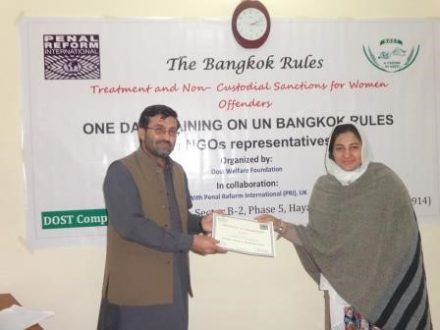Legal professionals and NGOs in remote Pakistan discuss the value of the UN Bangkok Rules

In November, PRI’s partner NGO in Pakistan, the DOST Welfare Foundation, which works in the north western border province of Khyber Pakhtunkhwa, trained 48 law students, 21 faculty members of local Law Colleges, and 30 NGO representatives from Peshawar on the UN Bangkok Rules on women offenders and prisoners.
The prison population in Khyber Pakhtunkhwa is reported to be as high as 12,000, but official capacity only for 5,000 prisoners. According to 2014 data, 120 women were detained in the five prisons in which DOST work, the majority undertrial, and 52 children living with them. Most had been detained for drug smuggling, trafficking, murder and prostitution, often driven by poverty, domestic conflicts, lack of education and awareness, and discrimination. Once in prison, there is often little family support for women and little access to rehabilitation programmes.
While Pakistan has a proactive judiciary, systemic problems such as a lack of knowledge of existing national and international standards for human rights; inadequate coordination between stakeholders in the criminal justice system; and a lack of training and low capacity of key players, seriously impede the administration of justice, especially for vulnerable groups. These problems are compounded in Khyber Pakhtunkhwa due to its position on the frontline against the problems of insurgency and terrorism.
Last month’s training for law students and legal professionals therefore discussed the particular situation of women prisoners in Pakistan and the extent to which standards given in the UN Bangkok Rules are implemented, and improvements that could be made. The training covered women offenders’ physical and mental health needs and their rehabilitation. Other issues discussed included overcrowding and poor conditions in the prisons, the lack of non-custodial measures for first-time and petty offenders and the extent to which legislation and policy in Pakistan, such as the Pakistan Prison Rules, are implemented and reflect the UN Bangkok Rules.
The training had positive results, with the Law Colleges now looking to incorporate the UN Bangkok Rules into their regular curriculum and NGOs attending committing to working with DOST on an advocacy campaign and practical programmes to improve the treatment of women prisoners in Khyber Pakhtunkhwa.
The training is part PRI’s partnership work with DOST 2014-16 to promote the UN Bangkok Rules for women prisoners in Pakistan and is made possible by the financial assistance of the UK Government (UK AID).